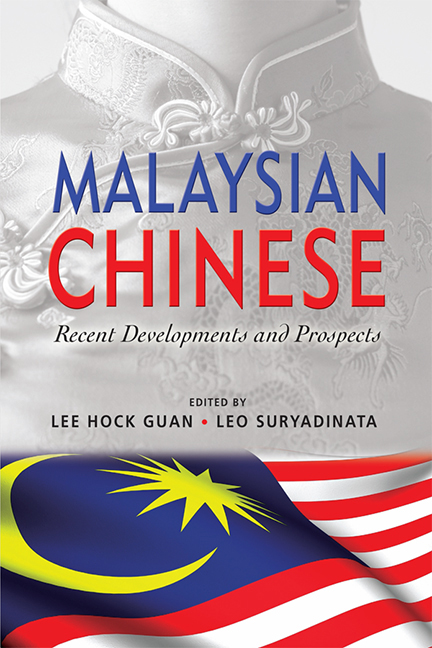Book contents
- Frontmatter
- Contents
- Preface
- Contributors
- Glossary
- Introduction
- 1 Malaysia: Ethnicity, Nationalism, and Nation Building
- 2 Being Muslim and Chinese in Malaysia
- 3 Quo Vadis: The Chinese in Malaysia
- 4 At a Crossroads: Malaysia's Coalition Politics and Chinese-based Political Parties
- 5 The End of Chinese Malaysians’ Political Division? The March 8 Political Tsunami and Chinese Politics in Penang, Selangor, and Perak
- 6 Forced to the Periphery: Recent Chinese Politics in East Malaysia
- 7 The New Malaysian Economic Agenda: Some Preliminary Observations
- 8 The Old And New Malaysian Chinese Language Press, with Special Reference to the 12th General Election
- 9 Education of the Chinese in Malaysia
- Index
6 - Forced to the Periphery: Recent Chinese Politics in East Malaysia
Published online by Cambridge University Press: 21 October 2015
- Frontmatter
- Contents
- Preface
- Contributors
- Glossary
- Introduction
- 1 Malaysia: Ethnicity, Nationalism, and Nation Building
- 2 Being Muslim and Chinese in Malaysia
- 3 Quo Vadis: The Chinese in Malaysia
- 4 At a Crossroads: Malaysia's Coalition Politics and Chinese-based Political Parties
- 5 The End of Chinese Malaysians’ Political Division? The March 8 Political Tsunami and Chinese Politics in Penang, Selangor, and Perak
- 6 Forced to the Periphery: Recent Chinese Politics in East Malaysia
- 7 The New Malaysian Economic Agenda: Some Preliminary Observations
- 8 The Old And New Malaysian Chinese Language Press, with Special Reference to the 12th General Election
- 9 Education of the Chinese in Malaysia
- Index
Summary
This chapter will chart the development of Chinese politics in the East Malaysian states of Sarawak and Sabah in the past decade. In general, Chinese politics in both states has taken the same trajectory as Chinese politics in the peninsula, that is, the political marginalization of the community, especially in electoral politics. The only key difference between Chinese politics in the peninsula and East Malaysia is the continued pre-eminence of local-based Chinese parties in both states.
CONTEMPORARY SARAWAK CHINESE POLITICS
The most significant change in Chinese politics in Sarawak in recent years was the defeat of the Sarawak United People's Party (SUPP) in the 2006 state election. Hitherto, the Chinese community had largely supported the SUPP against the Sarawak Democratic Action Party (DAP). SUPP was Sarawak's first political party, established by the Chinese community in 1959 with significant Dayak support. Although it started out as a left-wing party, from 1970 onward it emerged as a right wing, conservative, Chinese-based party. Since then it has lost much of its Dayak support although it still retains some Dayak majority seats due to the Sarawak BN seat allocation formula.
While the SUPP is the only Chinese-based party in the Sarawak BN, the main Chinese opposition is the DAP. The DAP was formed in the late 1970s by a renegade group of SUPP members who teamed up with antiestablishment Chinese who wanted a credible Chinese-based opposition party in Sarawak. The then Sarawak chief minister, Rahman Yakub, also encouraged the setting up of the DAP in order to weaken the SUPP.
Sarawak politics revolves around three major political groupings; the Chinese, the Malay/Melanau Muslims (MMM), and the Dayak (Non- Muslim Bumiputra [NMB]) community. Parti Pesaka Bumiputera Bersatu (PBB) serves as the main political party for the MMM, while the NMB spread their support among several Dayak-based parties such as the Pesaka wing of the PBB, SUPP, Parti Keadilan Rakyat (PKR), the Sarawak Progressive Democratic Party (SPDP), and the Parti Rakyat Sarawak (PRS). Although numerically the Dayaks constitute the largest segment of the community (about 40 per cent), they have never been united politically and are prone to political manipulation by the MMM and the Chinese elite.
- Type
- Chapter
- Information
- Malaysian ChineseRecent Developments and Prospects, pp. 109 - 124Publisher: ISEAS–Yusof Ishak InstitutePrint publication year: 2011



